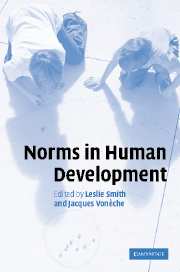Book contents
- Frontmatter
- Contents
- List of figures
- List of tables
- List of contributors
- Acknowledgments
- 1 Norms in human development: introduction
- Part I Norms and development in epistemology
- Part II Norms in moral and social development
- 6 Contextualizing moral judgment: challenges of interrelating the normative (ought judgments) and the descriptive (knowledge of facts), the cognitive and the affective
- 7 The development of obligations and responsibilities in cultural context
- 8 The multiplicity of social norms: the case for psychological constructivism and social epistemologies
- Part III Norms in cognitive development
- References
- Index
8 - The multiplicity of social norms: the case for psychological constructivism and social epistemologies
Published online by Cambridge University Press: 22 September 2009
- Frontmatter
- Contents
- List of figures
- List of tables
- List of contributors
- Acknowledgments
- 1 Norms in human development: introduction
- Part I Norms and development in epistemology
- Part II Norms in moral and social development
- 6 Contextualizing moral judgment: challenges of interrelating the normative (ought judgments) and the descriptive (knowledge of facts), the cognitive and the affective
- 7 The development of obligations and responsibilities in cultural context
- 8 The multiplicity of social norms: the case for psychological constructivism and social epistemologies
- Part III Norms in cognitive development
- References
- Index
Summary
The central issue this volume is meant to address is how the study of the psychology of development can deal with and contribute to understandings of norms. A central problem connected to this issue is that of how norms, which entail ‘oughts’, can be related to what is the case psychologically. Traditionally, psychologists have implicitly answered the ‘is to ought’ question by explaining ‘ought’ as ‘is’. That is, oughts take the guise of obligations not because of conceptualizations of norms but because of psychological mechanisms that lead people to behave with compulsion (and often lead people to the supposedly false view that they do so for normative reasons). As is well known, the two primary sources attributed to compulsion in beliefs and behaviours are learning and biology. In one set of positions, it is through conditioning, or social learning, or cultural participation that people develop habits or dispositions that involve constant actions (to paraphrase Martin Luther, ‘he cannot do otherwise because that is how he was socially engineered’). Analogously, psychologists have attempted to explain compulsion as due to people's biological make-up stemming from evolutionary forces. These can take the form of hard-wired actions or built-in intuitions due to emotional dispositions (‘he cannot do otherwise because that is the way he is biologically engineered’). In some explanations, of course, learning and cultural participation serve to reinforce the biologically given.
- Type
- Chapter
- Information
- Norms in Human Development , pp. 189 - 208Publisher: Cambridge University PressPrint publication year: 2006
- 1
- Cited by



